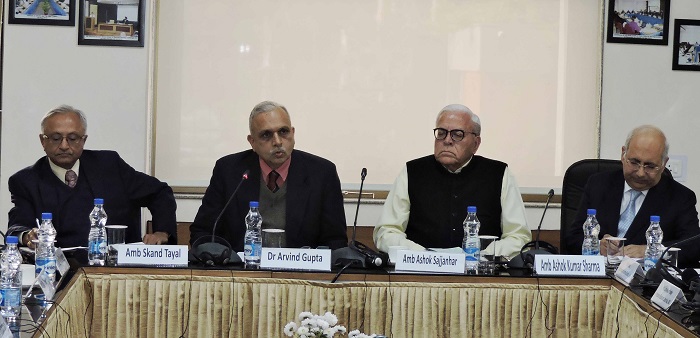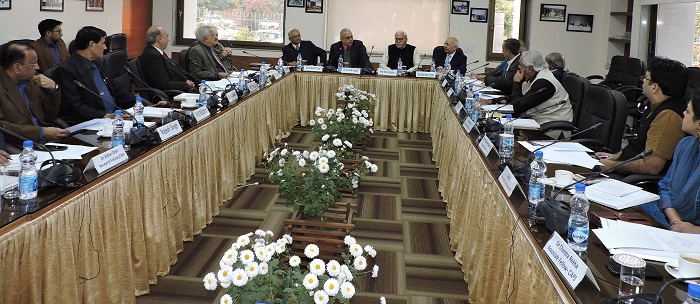Report and Recommendations
The Vivekananda International Foundation (VIF) organized a Round Table Discussion on ‘Taking India and Central Asia to the Next Level’ on 01 December 2017. Dr Arvind Gupta, Director, VIF delivered the Opening Remarks, followed by a Presentation on International North South Transport Corridor (INSTC) by Amb D. P. Srivastava, Distinguished Fellow, VIF. Speakers of the event, Amb Ashok Kumar Sharma, Amb Ashok Sajjanhar, Amb Skand Ranjan Tayal and Prof Sanjay Kumar Pandey highlighted various aspects of Indian engagements in Central Asia. At the end, Mr G. V. Srinivas, Joint Secretary, Eurasia Division, Ministry of External Affairs (MEA), made special remarks.
Salient points that emerged from the Discussion are as follows:-
Shanghai Cooperation Organization (SCO)
India’s membership of the Shanghai Cooperation Organization (SCO) has enhanced India’s strategic ‘presence’ in the Eurasian region. However, India needs to figure out its priorities within the SCO, as the organization is currently dominated by China. India can enhance cooperation with the SCO member-states to counter extremism and terrorism, including access to the database of Regional Anti-Terrorist Structure (RATS) at Tashkent.
SCO provides India an opportunity to enhance engagements with the Central Asian Republics (CAR), as there will be more high-level visits on regular basis. Nevertheless, India’s main focus vis-à-vis the CAR should be bilateral, as each of the CAR has its own peculiarities. We also have to take into consideration perspectives of the CARs about India’s role within the SCO.

Connectivity
India’s share in the global imports of the CAR is miniscule at 0.54 percent, one of the reasons being lack of connectivity. The INSTC, Chabahar Agreement and India’s accession to the Ashgabat Agreement are important projects, as these would link India not only with the CAR and Afghanistan, but also with Russia, Caucasia and East Europe.
Since India has ratified the ‘Transports Internationaux Routiers’ (TIR) Convention, which facilitates trans-border movement of goods, INSTC route can be immediately operationalized. Uzbekistan and Turkmenistan are also parties to the TIR convention. There is a Russian company that provides transport as well as leasing of containers. This could be utilized for the movement of goods to the CARs, apart from Russia.
China
China has penetrated deep into the CAR in economic terms. CAR figure prominently in Belt and Road Initiative (BRI). In fact, Chinese connectivity projects in CAR were underway since 2001-02, about a decade before the announcement of the BRI in 2013 in Astana. These projects were subsequently incorporated under the BRI umbrella. China’s economic influence is also coupled with strategic designs. Its military exercises in Tajikistan, supply of arms to some CAR, and Quadrilateral Cooperation between China, Afghanistan, Pakistan and Tajikistan are testimony to this.
Russia
Russia is a traditional partner and security provider of the CAR. Its presence is still considered benign within these countries. Influence of Russian language is still very high. India-Russia cooperation within CAR` can keep Chinese designs under check. Free Trade Agreement with Eurasian Economic Union (EEU) is likely to help India in enhancing trade.
Energy
Turkmenistan is putting high hopes in Turkmenistan- Afghanistan- Pakistan- India (TAPI) pipeline, mainly because it is looking for ‘reliable’ partners to sell its gas. Currently it is selling gas only to China. However, realization of TAPI in the near future is unlikely given the security situation in Afghanistan and Pakistan. Therefore, India has to look for alternate evacuation routes. We can explore bringing Turkmen gas through Iran to Chabahar, from where it can be transported to India through under-sea pipeline.

India-Central Asia
India carries a great degree of goodwill and respect in the minds of Central Asians. In terms of cultural influence and historical and emotional bonding, India enjoys considerable advantage over any other power. These countries look up to India for business, investments, IT, training, capacity building and education. As part of our defense cooperation, India trains number of security personnel from CAR, especially Tajikistan. There is still a lot of potential in terms of trade, connectivity and capacity building. It is high time that India should engage in a big way with its ‘extended neighborhood’.
Policy Recommendations:
• Indian Government may consider inviting President of Uzbekistan Mr Shavkat Mirziyoyev as the Chief Guest on India's Republic Day in 2019.
• Indian Government may establish ‘India- Central Asia Forum’ on the lines of ‘India-Africa Forum’, where Indian leadership can have regular meetings with Central Asian counterparts.
• Air connectivity between India and CAR should be improved, and should be extended to Indian cities like Mumbai, Kolkata, Bangalore and Chennai. We should explore establishment of the ‘Air Freight Corridor’ between India and Central Asia to carry goods.
• Negotiation should be initiated for the Chabahar- Zahedan railway line, for which a commitment was made during Prime Minister Modi’s visit to Iran in May 2016. India should in fact consider completing the entire Chabahar-Zahedan-Mashad railway line, to access oil and gas rich CAR. Mashad is already connected to Sarakhs railway junction on the Turkmenistan-Iran border.
• With India joining the TIR Convention, trade with CAR can start immediately along the INSTC route. We can use services provided by ‘Iran-Azerbaijan-Russia Consortium’ for the transport of goods as well as leasing of containers.
• The option of under-sea pipeline from Chabahar to India may be explored, as it avoids Pakistan, and transport of gas will be cheaper than the Liquefied Natural Gas (LNG).
• India may avail offer of import of uranium from Kazakhstan and Uzbekistan. This would augment and diversify sources of supply of uranium for our nuclear program. It would also be symbolic as these countries are members of Organization of Islamic Countries (OIC) and Nuclear Suppliers’ Group (NSG).
• We shall leverage our achievements in Space to build capacities, to promote our NAVIC and to forge space cooperation with the CAR.
• Indian IT majors may explore the possibilities of opening companies in Tashkent to provide IT enabled services and outsourcing for Russian market and corporates. The Russian language skill of Central Asian IT professionals with Indian software packages could open new markets in Russia. (Tashkent has an India aided Center for IT to train local IT personnel and it is well connected by air.)
• Through programs like Indian Technical and Economic Cooperation (ITEC) Programme and Indian Council for Cultural Relations (ICCR), we are creating large group of friendly professionals in these countries. MEA may prepare a proper database of the former students/ trainees of these programs. Government as well as institutes conducting these courses should regularly assess the relevance and usefulness of these courses.
• Developing expertise in Russian language is of utmost importance to enhance engagements in the CAR.
• Private Indian business can be encouraged to take up projects in CAR, especially those funded by World Bank, Asian Development Bank, European Bank for Reconstruction and Development (EBRD), Islamic Development Bank (IDB) etc.
• Track II dialogue process with the CARs, bilaterally as well as collectively, should be encouraged.





